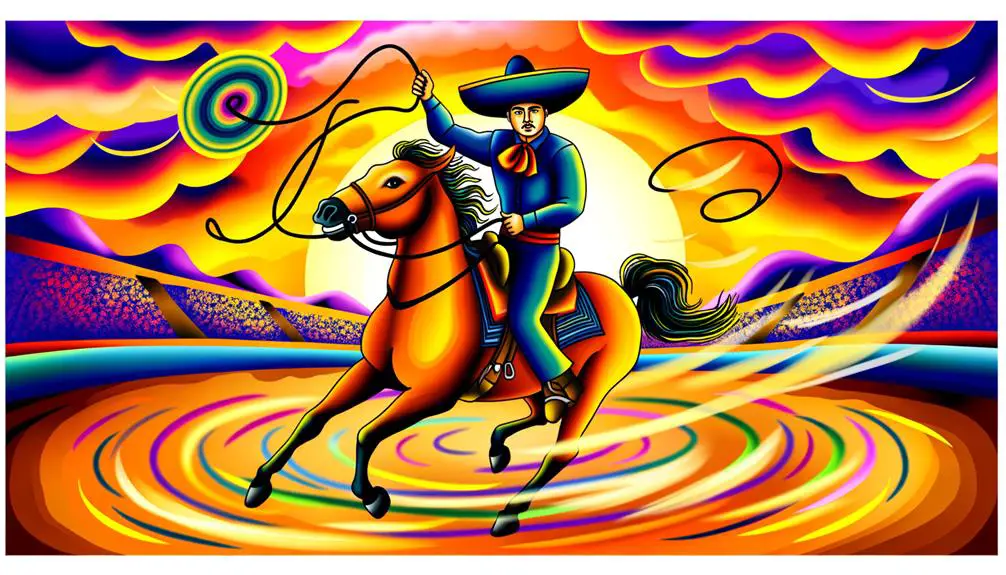When you need to give someone the green light in Spanish, you've got options. Try 'dale' for a versatile phrase that's perfect for encouragement, agreement, or confirmation. 'Vamos' or 'vamos allá' can initiate action, propose ideas, and create a casual atmosphere. For a stronger nudge, use 'adelante' to encourage taking the lead and embracing new opportunities. If you want to wish someone luck, 'buena suerte' is the way to go. Ready to give someone the approval? Explore more phrases to reveal a deeper understanding of Spanish slang and culture.
Giving the Green Light in Spain

In Spain, when you give someone 'el visto bueno' or 'la luz verde,' you're literally giving them the green light to proceed with a project or idea. This phrase is inspired by traffic signals, where a green light indicates it's safe to proceed. In Spain, this phrase has become an integral part of cultural norms, particularly in professional and academic settings. When you give someone 'el visto bueno,' you're signaling that their proposal, idea, or plan has been approved, and they can move forward with confidence.
This phrase is often used in formal and informal settings, from business meetings to casual conversations with friends. For instance, if a friend proposes a new business venture, you might say, '¡Tienes la luz verde!' (You have the green light!), indicating your support and approval. In Spain, 'el visto bueno' is more than just a phrase – it's a cultural symbol of trust, validation, and encouragement. By using this phrase, you're not only giving someone permission to proceed but also showing your confidence in their abilities.
Dale: The Ultimate Go-Ahead Phrase
You'll frequently hear 'dale' in everyday conversations in Spain, where it serves as a versatile phrase that can be used to express encouragement, agreement, or confirmation. This phrase is extremely useful, and mastering it will help you navigate everyday situations with confidence.
But where does 'dale' come from? Dale's origins can be traced back to the Latin 'dare,' meaning 'to give.' Over time, it evolved into a phrase that's deeply ingrained in Spanish culture.
Dale's variations are equally fascinating. You might hear 'dale pues' (go ahead then) or 'dale ya' (come on, let's go). These variations add a touch of personality to the original phrase, making it more expressive and context-dependent.
When used in informal settings, 'dale' can be a powerful tool for building rapport and fostering a sense of camaraderie. So, the next time you're in Spain, don't be afraid to throw in a 'dale' or two – it'll make your interactions all the more authentic and engaging.
Vamos: Let's Get This Started

Vamos, which literally means 'let's go,' is a versatile phrase that can be used to initiate action, propose an idea, or express enthusiasm, making it a valuable addition to your Spanish vocabulary.
You can use vamos to get things started, whether it's suggesting a plan, encouraging someone to take action, or simply expressing your excitement about an event or activity. For instance, you can say 'Vamos al cine' (let's go to the movies) or 'Vamos a empezar' (let's get started).
In the Vamos culture, this phrase is often used to build momentum and foster a sense of community. It's a call to action that can bring people together and create a sense of collective purpose.
However, there are also Vamos challenges that you may encounter. For example, using vamos in the wrong context or with the wrong tone can come across as insincere or pushy. To overcome these challenges, it's essential to understand the nuances of the phrase and use it in a way that feels natural and authentic.
Vamos Allá: The Casual Way
By adding the suffix '-alla' to vamos, you create a more casual and relaxed tone, perfect for informal gatherings or conversations with close friends. This subtle modification transforms the phrase into vamos allá, which is commonly used in everyday conversations.
When you say vamos allá, you're suggesting to head somewhere or do something in a casual, laid-back manner. For instance, you might say 'Vamos allá al parque' (Let's go to the park) or 'Vamos allá a la playa' (Let's go to the beach).
In informal settings, vamos allá is a popular casual expression that eliminates the need for formalities. You'll often hear it in everyday phrases, such as 'Vamos allá a comer algo' (Let's go get something to eat) or 'Vamos allá a ver una película' (Let's go watch a movie).
Adelante!: Take the Lead

What does it mean to take the lead with adelante?, a phrase that literally translates to 'forward' or 'onward' in English, but holds a more nuanced significance in Spanish conversations.
When you're told to adelante, you're being encouraged to take charge, assume leadership roles, and push forward with confidence. It's a call to action, urging you to step up and take the reins.
In essence, adelante is about personal empowerment. It's about embracing your inner strength, overcoming self-doubt, and believing in your abilities. When you adelante, you're not just moving forward; you're taking control of your life, your goals, and your aspirations. You're breaking free from limitations and embracing new opportunities.
In Spanish slang, adelante is more than just a phrase – it's a mindset. It's about being proactive, taking initiative, and driving change.
Vale!: Agreement and Approval
When someone says 'adelante' to urge you to take the lead, they're often followed by a 'vale' to confirm you're on the same page. This subtle yet powerful phrase is a staple in Vale culture, where agreement and approval are essential.
'Vale' literally means 'okay' or 'agreed,' but its significance goes beyond a simple affirmation. It's a verbal nod, a confirmation that you're on board with the plan or decision.
In everyday conversations, you'll hear 'vale' used to acknowledge agreements, confirm plans, or show understanding. For instance, if someone suggests meeting at a café, you might respond with 'vale' to indicate you're in. It's a way to show you're on the same wavelength, avoiding misunderstandings and ensuring smooth communication.
Vale expressions have become an integral part of Spanish slang, particularly among friends and acquaintances. By incorporating 'vale' into your vocabulary, you'll better navigate everyday conversations and demonstrate your understanding of the local culture.
Hala!: Spurring You On

In high-energy situations, you'll often hear 'hala' shouted to cheer you on, similar to 'come on' or 'let's go,' urging you to take action or push yourself harder. This motivational phrase is commonly used in sports, competitions, or any situation where an extra boost of energy is needed. When you hear 'hala,' you know someone is rooting for you to give it your all.
In Spanish culture, 'hala' is more than just a phrase – it's a way to show support and encouragement. It's a cultural nuance that embodies the spirit of camaraderie and teamwork. When you're struggling or need an extra push, 'hala' is the perfect phrase to get you moving. It's not just about winning or losing; it's about giving your best effort.
In casual conversations, you might hear 'hala' used in a more playful tone, similar to 'come on, let's do this!' or 'you got this!' It's a phrase that can instantly change the atmosphere, shifting from lazy to lively.
Claro!: Giving the Nod
After being spurred on with a hearty 'hala,' you'll often receive a nod of agreement or confirmation with a simple 'claro,' a versatile phrase that can convey a range of meanings depending on the context and tone.
In many cases, 'claro' serves as a way to clarify consent or agreement, ensuring everyone is on the same page. For instance, if you ask a friend if they want to grab lunch and they respond with 'claro,' you know they're in.
However, cultural nuances come into play when using 'claro.' In some regions, it can be used as a polite way to acknowledge someone, similar to saying 'yes, sir' or 'yes, ma'am.' In other areas, it's used more informally, similar to saying 'okay' or 'got it.'
When interacting with native Spanish speakers, it's essential to be aware of these cultural nuances to avoid miscommunication. By understanding the context and tone in which 'claro' is used, you can better navigate everyday conversations and build stronger relationships.
Buena Suerte!: Wishing You Luck

You'll often hear 'buena suerte' – literally 'good luck' – used to bid someone well before a challenging situation or important event. This phrase is more than just a casual farewell; it carries cultural significance and good vibes. When someone wishes you 'buena suerte', they're expressing their support and hoping for a positive outcome. It's a way to acknowledge the uncertainty of the situation while conveying confidence in your abilities.
In everyday conversations, 'buena suerte' is often used in a variety of contexts. You might hear it before a job interview, a big presentation, or even a first date. It's a way to show empathy and understanding, acknowledging that the situation might be intimidating.
Vamos a Ver!: Let's See What Happens
Vamos a Ver!: Let's See What Happens
Vamos a ver, a phrase that roughly translates to "let's see what happens," is a common Spanish expression that embodies the country's laid-back attitude towards uncertainty. When you say "vamos a ver," you're embracing the unknown and acknowledging that life is full of surprises. You're not trying to control the outcome, but rather, you're open to whatever comes next.
| Situation | Reaction |
|---|---|
| Uncertain plans | Vamos a ver, let's see what happens |
| Unexpected news | Vamos a ver, let's see what happens |
| Last-minute changes | Vamos a ver, let's see what happens |
| Unexpected obstacles | Vamos a ver, let's see what happens |
| Unforeseen opportunities | Vamos a ver, let's see what happens |
Frequently Asked Questions
Can I Use "Dale" in Formal Business Settings?
You're thinking of using 'dale' in a formal business setting? Think again! While it's a common phrase in casual conversations, it's not exactly suitable for formal boundaries.
In business etiquette, you want to maintain a level of professionalism, and 'dale' might come across as too relaxed or even dismissive. Stick to more formal language to avoid any misunderstandings.
Save 'dale' for coffee breaks with colleagues or casual meetups, not for boardroom presentations or client meetings.
Is "Vamos" Only Used for Initiating Actions?
When you use 'vamos' in Spanish, you're not limited to initiating actions. While it's true 'vamos' often means 'let's go' or 'come on,' it has nuances beyond that. You can use it to suggest, agree, or show enthusiasm.
If you want alternatives, consider 'empecemos' for 'let's start' or 'adelante' for 'go ahead.' Mastering 'vamos' and its alternatives will enhance your Spanish communication.
How Do You Respond to "¿Vamos Allá?" in Informal Settings?
Did you know that 70% of Spanish speakers use informal language in everyday conversations?
When someone says '¿Vamos allá?', you're being invited to join an activity. In informal settings, respond with 'Vale' (okay) or 'Genial' (great) to show enthusiasm.
Avoid overthinking cultural nuances; just be natural. For a more casual tone, use slang responses like 'Dale' (let's do it) or 'Vamos' (let's go).
Keep it simple, and you'll fit right in!
Is "Adelante" Only Used to Encourage Someone?
You might think adelante only means 'go ahead' in a motivational sense, but that's not entirely true.
Literally, adelante means 'forward' or 'onward,' and its nuances go beyond mere encouragement.
While it can be used to urge someone on, adelante can also indicate direction, progression, or continuation.
For example, 'adelante con la tarea' means 'move forward with the task.'
Can "Hala" Be Used to Motivate Oneself?
When motivating yourself, you often rely on self-talk to boost your confidence.
You can use 'hala' to stimulate your inner drive. This phrase becomes a powerful tool to cultivate Hala habits, helping you develop a growth mindset.
By integrating 'hala' into your self-motivation routine, you'll find yourself more focused and driven to achieve your goals.







